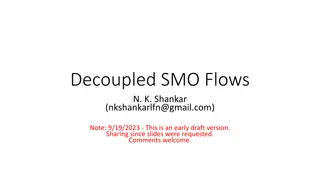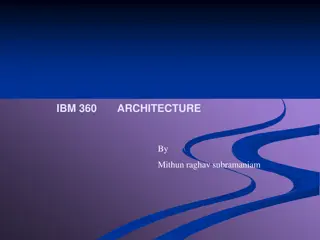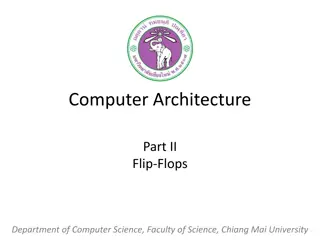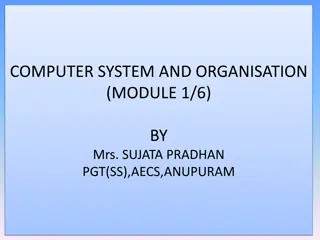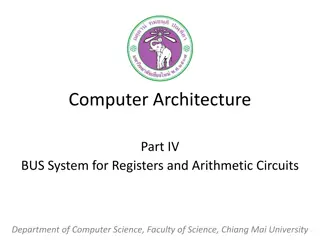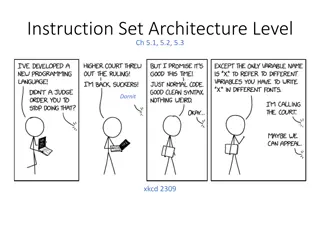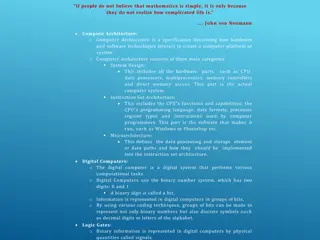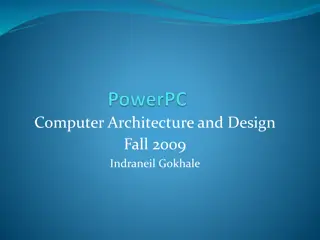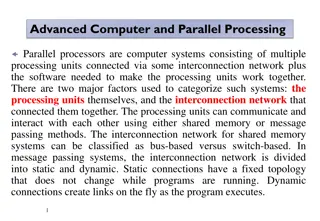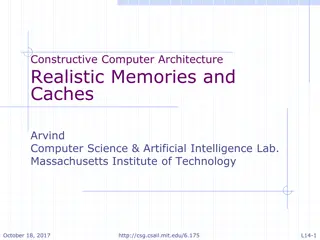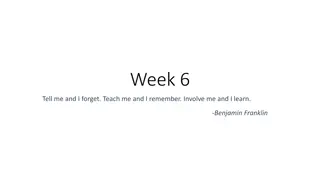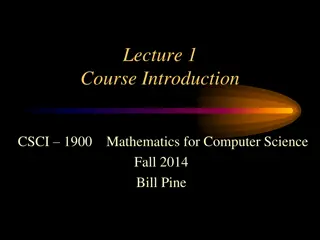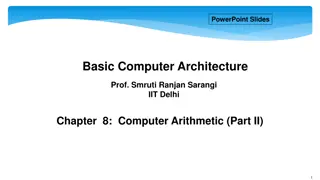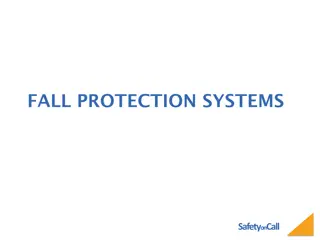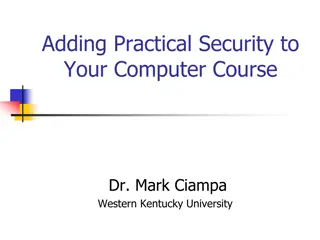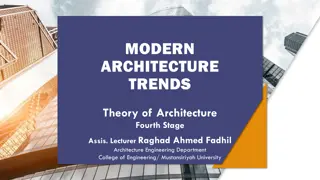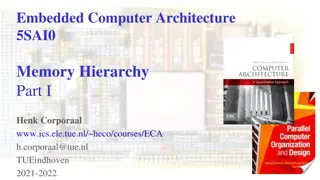Eric VanWyk's Course on Computer Architecture - Fall 2014
Join Eric VanWyk's course on Computer Architecture for an engaging learning experience. Explore topics like Boolean Logic, Modern History, and Engineering Communication. Get insights on continuous improvement and how to provide feedback effectively. Discover the course objectives, schedule, and more in this comprehensive guide.
Download Presentation

Please find below an Image/Link to download the presentation.
The content on the website is provided AS IS for your information and personal use only. It may not be sold, licensed, or shared on other websites without obtaining consent from the author. Download presentation by click this link. If you encounter any issues during the download, it is possible that the publisher has removed the file from their server.
E N D
Presentation Transcript
b0000 Zero Day ENGR xD52 Eric VanWyk Fall 2014
Agenda General Awkwardness Basic Orientation Information Course Objectives & Details Eric s guide to getting an A in CompArch Boolean Logic
Hi, Im Eric VanWyk, Class of 07
vanweric@gmail.com Email and IM
MH 353(?) Rarely IM/Email me first.
Monday & Thursday 1050-1230 1520-1800
http://wikis.olin.edu/ca/ ca@lists.olin.edu Feel free to use for discussion!
Times to See Eric Good Idea By Appointment! Terrible Idea Just Before Class I m busy panicking M&R 1330-1500 1245-1330 Unless you eat with me R 1800->
Continuous Improvement Feedback is extremely important Methods: Directly approach me in person (my favorite) Email me Talk to / Email a NINJA (they can anonymize) Talk to OSL, your advisor, Jessica, etc
Continuous Improvement This is my last CA semester (for awhile) Ben Hill is taking over He is awesome We are going to write letters to him 2 Assigned Students per day Volunteer more as you see fit
What is Computer Architecture? 3rdgrade math Modern History A Need for Speed Git r dun Engineering Communication
Write Programs for it In assembly
Build complex digital systems In Verilog
One Midterm (I am so excited)
Several Homeworks Done individually. Annotate collaboration per problem.
Four Labs Done in groups of 2 or 3
One Awesome Project Done in groups of ???
Late Policy: -10% for first 24 hours -20% for second (30% total) -30% for third (60% total) After 72 hours, no credit.
Unlate Policy Talk to me or Lyra in person first Commit to a new due date Email this new due date to comparch14@gmail.com Reminder note in your submission email.
Attendance Policy At your own risk.
How To Get an A in Comp Arch Do it in human first Break big problems in to better chunks Black Boxes! Learn enough C to know what a pointer is Pick a fun but appropriately sized final project Give me constant feedback
How to Seppuku CompArch Slack
Ninja Team Lyra Silverwolf Derek Redfern Emily Wang Jamie Gorson
Acknowledgements Mark L. Chang lecture notes for Computer Architecture (Olin ENGR3410) Patterson & Hennessy: Book & Lecture Notes Patterson s 1997 course notes (U.C. Berkeley CS 152, 1997) Tom Fountain 2000 course notes (Stanford EE182) Michael Wahl 2000 lecture notes (U. of Siegen CS 3339) Ben Dugan 2001 lecture notes (UW-CSE 378) Professor Scott Hauck lecture notes (UW EE 471) Mark L. Chang lecture notes for Digital Logic (NWU B01)
Digital vs. Analog Digital: only assumes discrete values Analog: values vary over a range continuously
Binary Logic Simplest form of Digital Logic Only two states True and False One and Zero Also called Boolean Logic
Example: Car Electronics Door ajar light (driver door, passenger door): High-beam indicator (lights, high beam selected):
Example: Car Electronics (cont.) Seat Belt Light (driver belt in): Seat Belt Light (driver belt in, passenger belt in, passenger present):
Basic Logic Gates AND NAND OR NOR XOR XNOR (exclusive or) NOT
Boolean Equations AND: AB A&B OR: A+B NOT: A ~A
Basic Boolean Identities: X + 0 = X * 1 = X + 1 = X * 0 = X + X = X * X = X + X = X * X = X =
Basic Boolean Identities: X + 0 = 0 X * 1 = X X + 1 = 1 X * 0 = 0 X + X = X X * X = X X + X = 1 X * X = 0 X = X
Basic Laws Commutative Law: X + Y = Y + X XY = YX Associative Law: X+(Y+Z) = (X+Y)+Z X(YZ)=(XY)Z Distributive Law: X(Y+Z) = XY + XZ X+YZ = (X+Y)(X+Z)
Advanced Laws X + 0 = X X * 1 = X X + 1 = 1 X * 0 = 0 X + X = X X * X = X X + X = 1 X * X = 0 X = X X(Y+Z) = XY+XZ X+YZ=(X+Y)(X+Z)
Homework for Monday Answer these question: Why are you taking this class? What is your favorite processor? Why? Name at least 3 things you want to learn in this class: Be specific! What do you want to do with what you learn here after graduation? Prognosticate! Email them to CompArch14@gmail.com Subject [HW0] Your Name
Homework Coming Soon Install ModelSim Install Xilinx tool chain Ninjas will help you with this





![❤Book⚡[PDF]✔ The Apollo Guidance Computer: Architecture and Operation (Springer](/thumb/21611/book-pdf-the-apollo-guidance-computer-architecture-and-operation-springer.jpg)

